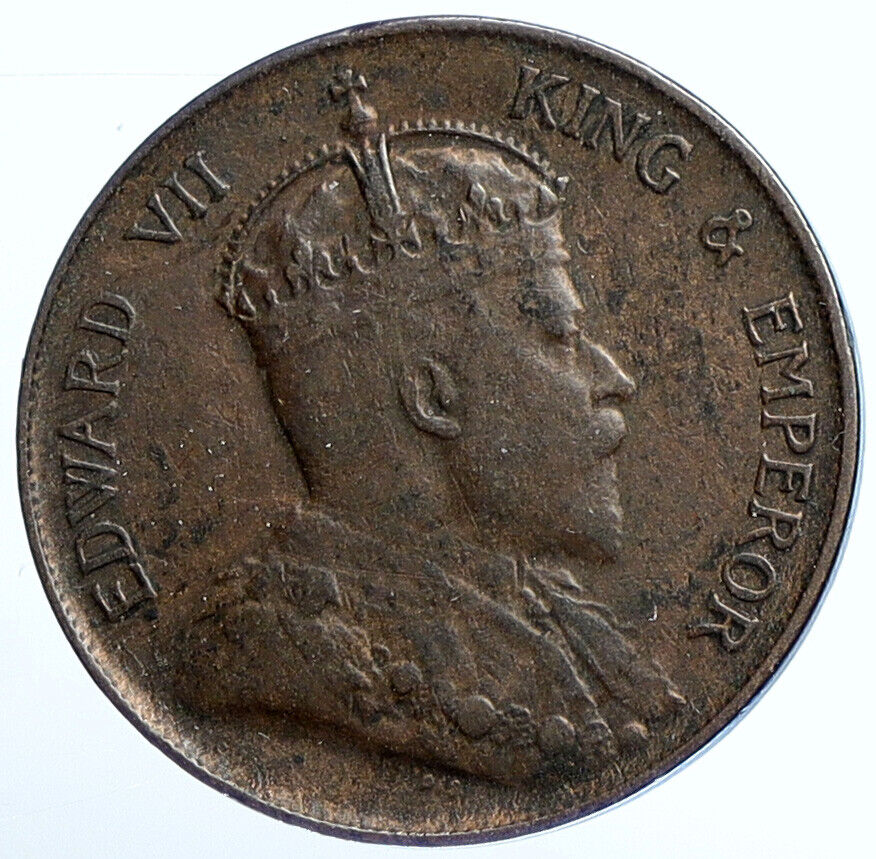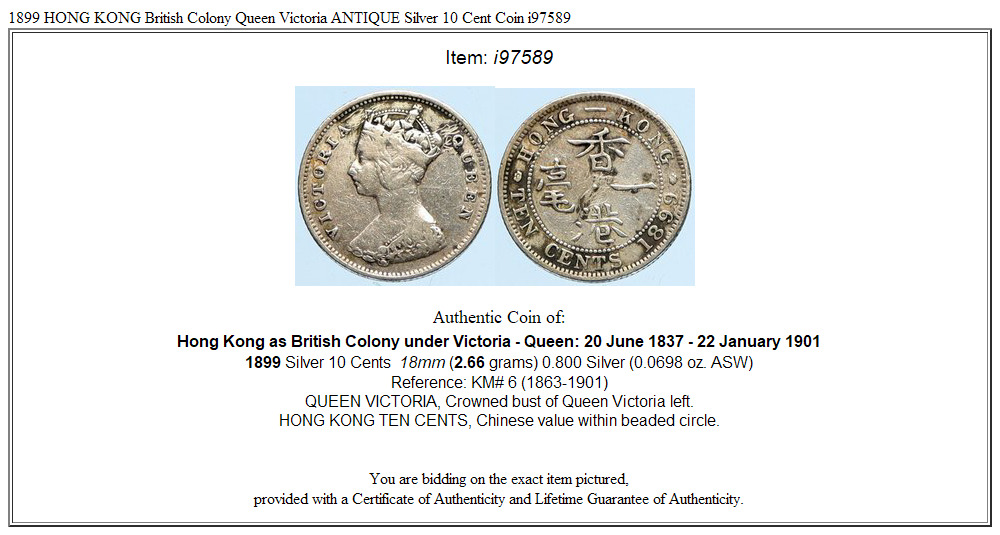|
Hong Kong as British Colony under George V – King: 6 May 1910 – 20 January 1936
1933 Cent Bronze 21mm (4.05 grams)
Reference: KM# 19 | Engraver: Edgar Bertram Mackennal
GEORGE V KING AND EMPEROR OF INDIA ., Crowned bust facing left.
• HONG – KONG • 香 仙 • 一 港 ONE CENT, Chinese value within beaded circle.
You are bidding on the exact item pictured, provided with a Certificate of Authenticity and Lifetime Guarantee of Authenticity.
 George V (George Frederick Ernest Albert; 3 June 1865 – 20 January 1936) was King of the United Kingdom and the British Dominions, and Emperor of India, from 6 May 1910 until his death in 1936. George V (George Frederick Ernest Albert; 3 June 1865 – 20 January 1936) was King of the United Kingdom and the British Dominions, and Emperor of India, from 6 May 1910 until his death in 1936.
He was the second son of Albert Edward, Prince of Wales (later King Edward VII), and the grandson of the reigning British monarch, Queen Victoria. From the time of his birth, he was third in the line of succession behind his father and his elder brother, Prince Albert Victor, Duke of Clarence and Avondale. From 1877 to 1891, George served in the Royal Navy, until the unexpected death of his elder brother in early 1892 put him directly in line for the throne. On the death of his grandmother in 1901, George’s father became King-Emperor of the British Empire, and George was created Prince of Wales. He succeeded his father in 1910. He was the only Emperor of India to be present at his own Delhi Durbar.
His reign saw the rise of socialism, communism, fascism, Irish republicanism, and the Indian independence movement, all of which radically changed the political landscape. The Parliament Act 1911 established the supremacy of the elected British House of Commons over the unelected House of Lords. As a result of the First World War (1914-18) the empires of his first cousins Tsar Nicholas II of Russia and Kaiser Wilhelm II of Germany fell while the British Empire expanded to its greatest effective extent. In 1917, George became the first monarch of the House of Windsor, which he renamed from the House of Saxe-Coburg and Gotha as a result of anti-German public sentiment. In 1924 he appointed the first Labour ministry and in 1931 the Statute of Westminster recognised the dominions of the Empire as separate, independent states within the Commonwealth of Nations. He was plagued by illness throughout much of his later reign and at his death was succeeded by his eldest son, Edward VIII.
  Hong Kong (literally: “Fragrant Harbour”), officially Hong Kong Special Administrative Region of the People’s Republic of China, is an autonomous territory on the southern coast of China at the Pearl River Estuary and the South China Sea. Hong Kong is known for its skyline and deep natural harbour. It has a land area of 1104 km2 and shares its northern border with Guangdong Province of Mainland China. With around 7.2 million inhabitants of various nationalities, Hong Kong is one of the world’s most densely populated metropolises. Hong Kong (literally: “Fragrant Harbour”), officially Hong Kong Special Administrative Region of the People’s Republic of China, is an autonomous territory on the southern coast of China at the Pearl River Estuary and the South China Sea. Hong Kong is known for its skyline and deep natural harbour. It has a land area of 1104 km2 and shares its northern border with Guangdong Province of Mainland China. With around 7.2 million inhabitants of various nationalities, Hong Kong is one of the world’s most densely populated metropolises.
After the First Opium War (1839-42), Hong Kong became a British colony with the perpetual cession of Hong Kong Island, followed by Kowloon Peninsula in 1860 and a 99-year lease of the New Territories from 1898. Hong Kong remained under continuous British control for about a century until the Second World War, when Japan occupied the colony from December 1941 to August 1945. British control resumed in 1945 following the Surrender of Japan. In the 1980s, negotiations between the United Kingdom and China resulted in the 1984 Sino-British Joint Declaration, which provided for the transfer of sovereignty of Hong Kong on 30 June 1997. The territory became a special administrative region of China with a high degree of autonomy on 1 July 1997 under the principle of one country, two systems. Disputes over the perceived misapplication of this principle have contributed to popular protests, including the 2014 Umbrella Revolution.
In the late 1970s, Hong Kong became a major entrepôt in Asia-Pacific. The territory has developed into a major global trade hub and financial centre. The 44th-largest economy in the world, Hong Kong ranks top 10 in GDP (PPP) per capita, but also has the most severe income inequality among advanced economies. Hong Kong is one of the three most important financial centres alongside New York and London, and the world’s number one tourist destination city. The territory has been named the freest market economy. The service economy, characterised by free trade and low taxation, has been regarded as one of the world’s most laissez-faire economic policies, and the currency, the Hong Kong dollar, is the 13th most traded currency in the world.
The Hong Kong Basic Law is its quasi-constitution which empowers the region to develop relations and make agreements directly with foreign states and regions, as well as international organizations, in a broad range of appropriate fields. It is an independent member of APEC, the IMF, WTO, FIFA and International Olympic Committee among others.
Limited land created a dense infrastructure and the territory became a centre of modern architecture, and has a larger number of highrises than any other city in the world. Hong Kong has a highly developed public transportation network covering 90 per cent of the population, the highest in the world, and relies on mass transit by road or rail. Air pollution remains a serious problem. Loose emissions standards have resulted in a high level of atmospheric particulates. Nevertheless, residents of Hong Kong (sometimes referred to as Hongkongers) enjoy one of the longest life expectancies in the world.
|





 George V (George Frederick Ernest Albert; 3 June 1865 – 20 January 1936) was King of the United Kingdom and the British Dominions, and Emperor of India, from 6 May 1910 until his death in 1936.
George V (George Frederick Ernest Albert; 3 June 1865 – 20 January 1936) was King of the United Kingdom and the British Dominions, and Emperor of India, from 6 May 1910 until his death in 1936.
 Hong Kong (literally: “Fragrant Harbour”), officially Hong Kong Special Administrative Region of the People’s Republic of China, is an autonomous territory on the southern coast of China at the Pearl River Estuary and the South China Sea. Hong Kong is known for its skyline and deep natural harbour. It has a land area of 1104 km2 and shares its northern border with Guangdong Province of Mainland China. With around 7.2 million inhabitants of various nationalities, Hong Kong is one of the world’s most densely populated metropolises.
Hong Kong (literally: “Fragrant Harbour”), officially Hong Kong Special Administrative Region of the People’s Republic of China, is an autonomous territory on the southern coast of China at the Pearl River Estuary and the South China Sea. Hong Kong is known for its skyline and deep natural harbour. It has a land area of 1104 km2 and shares its northern border with Guangdong Province of Mainland China. With around 7.2 million inhabitants of various nationalities, Hong Kong is one of the world’s most densely populated metropolises.




